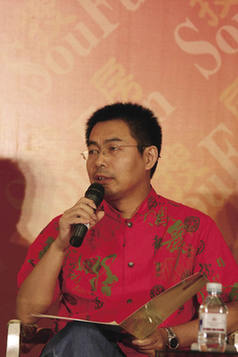|
Battle for Resources
The price of crude oil has plummeted from a peak of nearly US $150 a barrel to US $30-40 today. Moreover, China's Producer Price Index (PPI) in January 2009 was down 3.3 percent on the same period of 2008, while its previously rocketing CPI had slowed to just one percent increase year-on-year. With a flat PPI and CPI, both the government and the public are looking at ways to stabilize and speed up economic growth.
But Shi Hanbing believes the danger is far from over. He says: "It is like the calm before the coming storm of the next round of global inflation." He reasons that it is only a matter of time before the huge sums of bailout money being pumped into Western economies lead to serious currency devaluation and inflation. The falling dollar led to ballooning commodity prices, and again, the US benefited as Chinese exports became more expensive to produce and less competitive on international markets. As well as boosting American exports, the weakened dollar also effectively slashed the country's national debt.
Meanwhile, now that the bailout plan seems to be helping the dollar to regain some of its strength, Shi reckons: "It won't last long." He asserts that the dollar will continue to depreciate, and worries that further falls could encourage renewed speculation on commodities. This would persent Chinese exporters with more problems in the form of higher raw material import costs.
Since China's export sector is based mainly on the manufacture of low value-added products, made possible by a large, low-cost labor pool, inflation of any kind hits it hard. Thus it is the United States – or, more accurately, certain vested interest groups therein – that has benefited from the depreciation of US dollar.
Given the critical importance of resource prices to the global economy, Shi thinks China and other developing nations should play the US at a similar game. He says: "Developing nations should try to maintain some control over limited resources, especially minerals. We must regard such resources as our life-blood, and do all we can to protect them."
One way to maintain such control, Shi argues, is to export fewer resources and import more, as he regards resources as the "most dependable currency." He says China has so far paid too much attention to currency reserves, which are declining in value, and too little attention to resource reserves. Restore a balance, and the result would be two-fold: Firstly, China would not be overly concerned about depreciation of its currency reserves. Secondly, China itself could gain the upper hand by stockpiling increasingly rare resources. To achieve this, Shi advises China to boost ties with overseas resource exporters, perhaps in the form of mergers.
What We Should Do
Cao Jianhai is a researcher from the Chinese Academy of Social Sciences' Institute of Industrial Economics. In the prologue of Which Way Should China Turn he writes: "To expand domestic demand, the Chinese government has implemented a series of measures to revive the real estate market and promote Chinese exports."
In fact, soaring real estate prices have nibbled at the public's purchasing power and thus curbed domestic demand. And the low salaries that have kept Chinese products competitive on the global market inevitably restrict people's purchasing power at home.
Shi Hanbing suggests that the Chinese government could draw upon some elements of Japan's National Income Multiplication Plan, which was introduced in the 1960s. It introduced a series of measures such as income tax cuts and rebates that was aimed at allowing workers to keep more of their earnings in their own pockets – and thus have more money to spend.
|
 |
|
The author Shi Hanbing.
China Foto Press |
Shi believes that the pressures on export-oriented enterprises brought about by the appreciation of the Renminbi can be alleviated. Statistics show that profit margins in many small firms in China's export-led southeastern provinces can be as low as 5-6 percent. As the RMB has appreciated, these firms have struggled to remain profitable, and large numbers of them have gone out of business. Shi thinks that making the Renminbi fully tradable would solve this problem, despite the government's concerns that the currency is not yet mature enough to prevent huge inflows of hot money. Shi says that hot money has flooded in regardless, and "what we should do now is to strengthen supervision and pave the way for the free convertibility of the Renminbi."
Establishing a unified currency pact with other Asian powerhouses like Japan, the ROK and India could protect the region against future financial crises and galvanize regional economic development.
Shi stresses in his book: "Finance, not guns, plays the leading role in modern warfare. Similarly it is financial masters, not brave soldiers, who destroy an economic sovereignty." Now the financial crisis may testify his point. | 